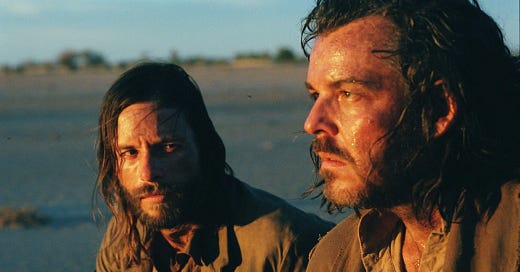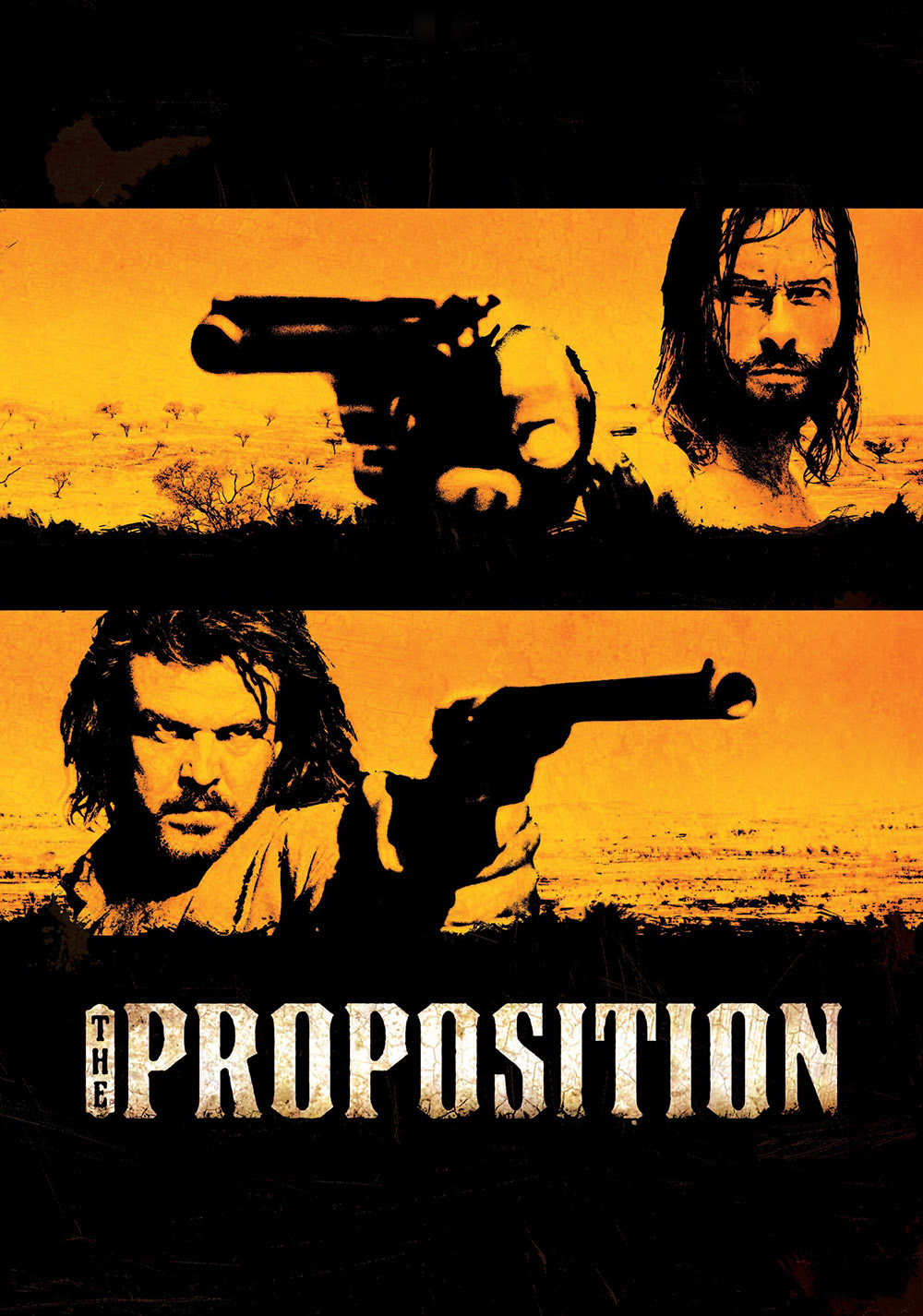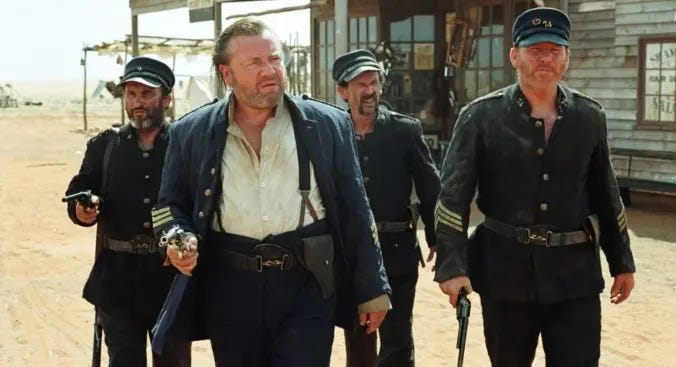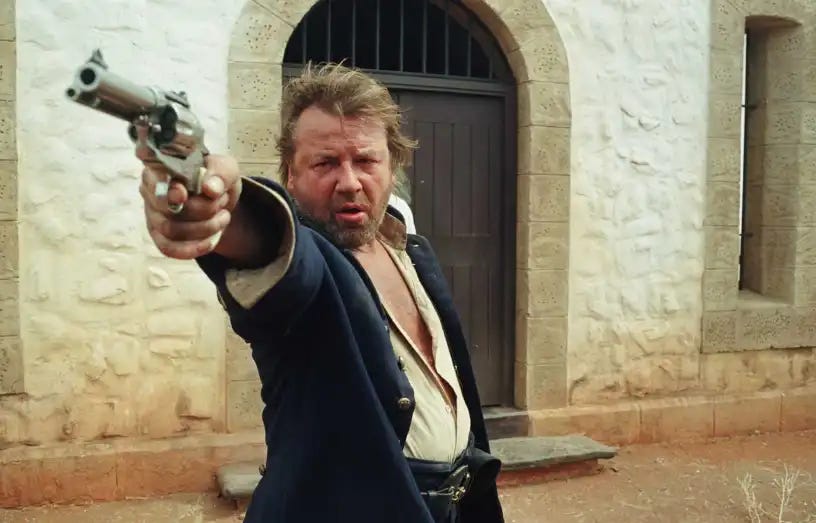Directed by John Hillcoat
Australia & UK, 2005
Australia… What fresh hell is this?
A phrase commonly attributed to the American wit Dorothy Parker, but in The Proposition these are the words of Captain Stanley (Ray Winston), a former London policeman, spoken sometime in the 1880s. By the end of this haunting film, it remains a question with no clear answer.
The Proposition is a Western directed by John Hillcoat with a screenplay by Nick Cave – yes, that Nick Cave. A Western but not set in the old American West. This is the Australian Outback. You will soon recognise that from the opening credits: a montage of black-and-white photographs showing clapboard houses, hotels, and a school. Amidst these images we see faces, of settlers and Aboriginal Australians, and finally corpses and graves. All set against the ironic innocence of a girl singing the hymn: There is a Happy Land.
Nick Cave may be a songwriter, but this is not The Ballad of Buster Scruggs. The Proposition is a Western very much in the revisionist tradition. To borrow a phrase, at times it is nasty, at times brutish, and it is also relatively short at 104 minutes. And there are lots and lots of flies. But don’t let that put you off, because like a ballad The Proposition is a simple story – with more than a hint of a classical tragedy – beautifully told.
I will civilise this land – Captain Stanley
Stanley has been hired to bring some law and order to the Banyon settlement, and specifically to apprehend a family of Irish bushrangers, the notorious Burns brothers, wanted for the brutal and depraved murder of local farmers, the Hopkins family. A bloody shootout in a brothel is our introduction to two of the brothers. Charlie, and the hapless, terrified, 14-year-old Mikey (Richard Wilson), are captured. But it’s Arthur, the ringleader and eldest of the brothers who is the real target. So, a deal is offered: if Charlie brings in his brother, Stanley will pardon the two of them. Otherwise, in nine days’ time, on Christmas Day, Mikey will be hanged. That is ‘the proposition’.
Ray Winston is on great form as the grizzled Captain Stanley, tormented both by the sweltering heat and chronic headaches. He is fiercely protective of his doting wife Martha (Emily Watson), but they are not well suited to the Outback. Perhaps patrolling the seedy slums of London’s Whitechapel wasn’t such a bad gig after all?
The Proposition is a story with no heroes, precious little romance, and muddied motivations. There is little exposition, yet whilst the screenplay is efficient and economical, the killing on screen certainly isn’t. This is a film with an unflinching attitude toward violence. The brooding, impassive Clint Eastwood role is taken by Guy Pearce as Charlie, who acting as the conscience of the brothers, shows at least some semblance of humanity. Although his role is central, it really is Danny Huston as Arthur who burns the brightest. A Rasputin-like figure, unsparingly sadistic in his methods, Arthur spends much of the film standing – a silhouette against the setting Sun – contemplating the landscape, a veritable Wizard of Oz.
He sits up there in those melancholy hills. Some say he sleeps in caves like a beast. Slumbers deep like the kraken. The Blacks say that he’s a spirit. The troopers will never catch him.
The Aboriginal men are a quiet but constant presence. Some work alongside the police, like the tracker played by David Gupilil; others, like Two Bob (Tom E Lewis), side with the Burns brothers. They look on, wondering what to make of this ‘civilisation’ of the white man. In one telling moment, before the film’s explosive climax, Stanley dismisses his besuited ‘house boy’, Toby (Rodney Boschman). Before he opens the garden gate, Toby carefully removes his shoes and leaves them behind – now barefoot, he is renewing his contact with the land.
Yes, The Proposition certainly has an impressive cast, including John Hurt, who entertains with the film’s few moments of levity. Enjoying a cameo as bounty-hunter Jellon Lamb, he plays an educated man who loves to recite a line of poetry. Beginning a disquisition on Darwin’s recently published ‘On the Origin of Species’, Lamb reveals he is as racist toward the Irish as he is towards the indigenous Australians. Realising that Charlie Burns is an Irishman he quickly pivots:
Oh, as the waters of Ennis, sir. Let us drink, then, to the Irish. No finer race of men has ever... peeled a potato.
The Queensland landscape is as much a character in this story as any of the cast. The searing heat and the stark aridity of the Outback are reflected in the blazing copper hues of the sky. Searing and stark, also an apt description for The Proposition’s score, a collaboration between Nick Cave and one of the original Bad Seeds, Warren Ellis. Veering from the ominous to the melancholy, don’t expect any emotional relief.
With its narrative of revenge The Proposition owes a lot to John Ford’s classic western, The Searchers. In both films the family home is an anchor, albeit a fragile one, representing stability and civilisation. When Charlie is first released by Captain Stanley, he visits the wreckage of what was the home of the murdered Hopkins family. With its charred walls, and smashed and bloodied furniture, the only item left untouched is a baby’s crib. This domestic setting is mirrored in the film’s finale as Stanley and Martha sit down for their Christmas dinner in their pristine clapboard house, decorated with a festive tree and cotton wool snow. As Stanley carves the turkey, you know it’s only a matter of time before they will be rudely interrupted.
When Charlie first catches up with his older brother – a family reunion of sorts, Arthur asks him, “What happened to young Mikey? How is he doing?” Rather than the truth – Mikey is in prison and unlikely to survive – Charlie spins a yarn about how Mikey settled down with a girl. Her name is Molly O’Boyle and her hair is as red as the sunset. Arthur knows that Charlie is lying. But we all need our fictions, don’t we?
I really liked it. A simple but classically western setup, kill your older brother or your younger brother will hang. Explored family law and order and the extreme violence of colonialism - N
You relate to that do you? - C
Reids’ Results (out of 100)
C - 73
T - 76
N - 82
S - 78
ReidsonFilm have just realised that our current season, number four, has been going for quite some time now. In fact it is over twice the length of our earlier seasons. So, after this, our 128th week, we are taking our collective foot off the pedal and will be back soon with our regular reviews. In the meantime, keep an eye on your inbox for some extras.








